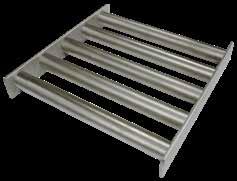
2 minute read
Metal Detection
METAL DETECTION IN THE RECYCLING INDUSTRY
Even the smallest amount of metal contamination that is not properly removed from a recycled product can seriously harm a customer, devastate a brand’s reputation, and inflict the heavy financial costs of liability, product recall and damage to production equipment.
Metal particles are the most common source of foreign contamination in recycled material processing, and this contamination can frequently enter the product stream as a result of the wear and breakage of other processing equipment in the production facility.
Bunting metal detectors are able to sense and reject extremely small, ferrous metal particles from the process flow or from shredded recycled material, even detecting metal encapsulated in individual plastic particles. With Bunting metal detection equipment integrated into your process, you will be able to send your product to market with complete confidence.
HOW METAL DETECTORS WORK
The product passes through an opening in the detector, which houses a unique three-coil search head. This is comprised of windings around an aperture opening, whether round or rectangular. There is a transmitter in the center of this coil with two receivers surrounding it, one placed at the entrance of the search head and one at the exit. Within the aperture opening, an electromagnetic field is created. When a piece of metal passes through the coil opening, a signal is generated and calculated, activating further operations or devices. All metal detectors utilize electronic control packages designed by Bunting to specifically fit with our metal detection equipment.
Some metal detectors are equipped with automatic reject mechanisms, which isolate contaminated material and remove it from the product flow. Bunting’s automatic reject mechanisms operate quickly and efficiently, meaning that the removal of contaminated product does not come at the expense of slowing down your operating process.

BUNTING DESIGN ENSURES MECHANICAL INTEGRITY As our description of metal detector operation suggests, metal detectors are highly sensitive. They are precisely calibrated instruments that can be affected by vibration, electrical fields, and other environmental conditions.
To ensure the most reliable operation in demanding environments, Bunting metal detectors are designed and manufactured to a higher standard of durability and signal strength. The search head is filled with catalyzed epoxy, to eliminate void areas inside the housing. This waterproofs the search head and stabilizes it against vibration. Coils and electronics may have an IP Enclosure rating for dust and water protection from IP54 to IP65 and IP69K.
Advanced shielding technology in the Bunting design provides superior protection from outside interference. Bunting metal detectors therefore require shorter metal-free zones, and are able to operate in difficult environments where competing detectors cannot.
BUNTING QUALITY CONTROL Depending on the level of electronics you select, Bunting® metal detectors have recording and reporting functions within the software. Optional features allow your organization to connect detectors for remote monitoring, reporting or control.
SELECTING THE BUNTING METAL DETECTOR FOR YOUR OPERATION Recycling companies must manage unique process flow conditions and the challenges of handling many different types of material. To assist our customers in choosing the metal detector best suited for their operating conditions, we pair each customer with a Bunting representative to aid the decision making process. Your Bunting representative is available to consult at any phase of the design process. We can assist in both integrating new equipment into established operations as well as planning a new facility from scratch.










